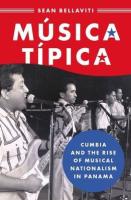Description
Through extensive archival and ethnographic research, Bellaviti reconstructs a twentieth-century social history that illuminates the crucial role music has played in the formation of national identities in Latin America. Focusing, in particular, on the relationship between cumbia and the rise of populist Panamanian nationalism in the context of U.S. imperialism, Bellaviti argues that this hybrid musical form, which forges links between the urban and rural as well as the modern and traditional, has been essential to the development of a sense of nationhood among Panamanians. With their approaches to musical fusion and their carefully curated performance identities, cumbia musicians have straddled some of the most pronounced schisms in Panamanian society.
Product Details
- Oxford University Press, Brand
- Sep 30, 2020 Pub Date:
- 9780190936471 ISBN-13:
- 0190936479 ISBN-10:
- 320 Pages
- English Language
- 9.1 in * 6.1 in * 0.8 in Dimensions:
- 1 lb Weight:




